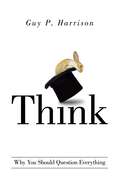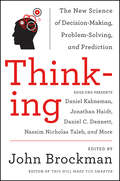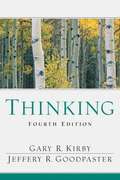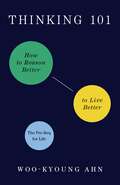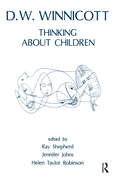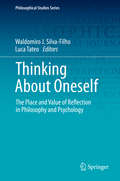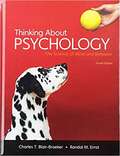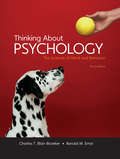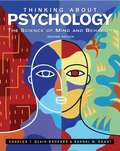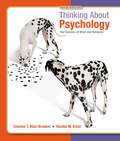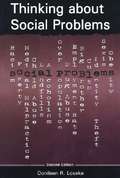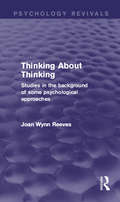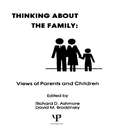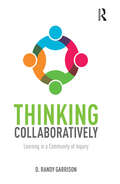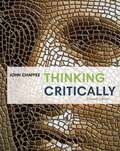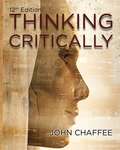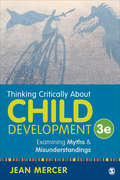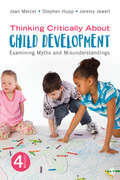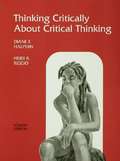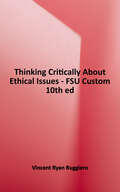- Table View
- List View
Think: Why You Should Question Everything
by Guy P. HarrisonThink more critically, learn to question everything, and don't let your ownbrain trip you up. This fresh and exciting approach to science, skepticism, and critical thinking will enlighten and inspire readers of all ages. With a mix of wit and wisdom, it challenges everyone to think like a scientist, embrace the skeptical life, and improve their critical thinking skills. Thinkshows you how to better navigate through the maze of biases and traps that are standard features of every human brain. These innate pitfalls threaten to trick us into seeing, hearing, thinking, remembering, and believing things that are not real or true. Guy Harrison's straightforward text will help you trim away the nonsense, deflect bad ideas, and keep both feet firmly planted in reality. With an upbeat and friendly tone, Harrison shows how it's in everyone's best interest to question everything. He brands skepticism as a constructive and optimistic attitude--a way of life that anyone can embrace. An antidote to nonsense and delusion, this accessible guide to critical thinking is the perfect book for anyone seeking a jolt of inspiration.
Thinking
by John BrockmanUnlock your mindFrom the bestselling authors of Thinking, Fast and Slow; The Black Swan; and Stumbling on Happiness comes a cutting-edge exploration of the mysteries of rational thought, decision-making, intuition, morality, willpower, problem-solving, prediction, forecasting, unconscious behavior, and beyond. Edited by John Brockman, publisher of Edge. org ("The world's smartest website"--The Guardian), Thinking presents original ideas by today's leading psychologists, neuroscientists, and philosophers who are radically expanding our understanding of human thought. Daniel Kahneman on the power (and pitfalls) of human intuition and "unconscious" thinking - Daniel Gilbert on desire, prediction, and why getting what we want doesn't always make us happy - Nassim Nicholas Taleb on the limitations of statistics in guiding decision-making - Vilayanur Ramachandran on the scientific underpinnings of human nature - Simon Baron-Cohen on the startling effects of testosterone on the brain - Daniel C. Dennett on decoding the architecture of the "normal" human mind - Sarah-Jayne Blakemore on mental disorders and the crucial developmental phase of adolescence - Jonathan Haidt, Sam Harris, and Roy Baumeister on the science of morality, ethics, and the emerging synthesis of evolutionary and biological thinking - Gerd Gigerenzer on rationality and what informs our choices
Thinking (4th Edition)
by Gary R. Kirby Jeffery R. GoodpasterThis book about thinking presents readers with a systematic, practical, and friendly approach that encompasses all fields of study and business. It explores a valuable skill that will inspire and enlarge people's ability to think through life. Chapter topics cover what thinking is, personal barriers, sensing, brain and memory, language, feeling, creative thinking, organizing, logical thinking, scientific thinking, persuasive thinking, problem solving, evaluating, decision and action, and the challenge to go on thinking. They draw ideas on thinking from every period of history–from the philosophers, poets, scientists, psychologists, linguists, and neuroscientists. For thinkers of the new millenium.
Thinking 101: How to Reason Better to Live Better
by Woo-kyoung Ahn“An INVALUABLE RESOURCE to anyone who wants to think better.” —Gretchen RubinAward-winning YALE PROFESSOR Woo-kyoung Ahn delivers “A MUST-READ—a smart and compellingly readable guide to cutting-edge research into how people think.” (Paul Bloom)“A FUN exploration.” —Dax ShepardPsychologist Woo-kyoung Ahn devised a course at Yale called “Thinking” to help students examine the biases that cause so many problems in their daily lives. It quickly became one of the university’s most popular courses. Now, for the first time, Ahn presents key insights from her years of teaching and research in a book for everyone.She shows how “thinking problems” stand behind a wide range of challenges, from common, self-inflicted daily aggravations to our most pressing societal issues and inequities. Throughout, Ahn draws on decades of research from other cognitive psychologists, as well as from her own groundbreaking studies. And she presents it all in a compellingly readable style that uses fun examples from pop culture, anecdotes from her own life, and illuminating stories from history and the headlines.Thinking 101 is a book that goes far beyond other books on thinking, showing how we can improve not just our own daily lives through better awareness of our biases but also the lives of everyone around us. It is, quite simply, required reading for everyone who wants to think—and live—better.
Thinking About Children
by Donald W. WinnicottThinking About Children collects thirty-one papers, of which twenty-eight have never previously been published. As might be expected, they range widely in tone and content from concise clinical observations to more general meditations including the landmark paper "Towards an objective study of human nature". Of particular interest are sections on autism and psychosomatics, where the author's thinking can be seen to foreshadow more recent developments, such as Frances Tustin's work on autism. Together with a substantial introduction by the editors, this book indispensable for those acquainted with the author's work, and an ideal introduction for those who have not yet encountered the extraordinary clarity and depth of his thought.
Thinking About Human Memory
by Humphreys, Michael S. and Chalmers, Kerry A. Michael S. Humphreys Kerry A. ChalmersThinking About Human Memory provides a novel analytical approach to understanding memory that considers the goals of the memory task, the cues and information available, the opportunity to learn, and interference from irrelevant information (noise). Each of the five chapters describing this approach introduces historical ideas and demonstrates how current thinking both differs from and is derived from them. These chapters also contain analyses of current problems designed to demonstrate the power of the approach. In a subsequent chapter, the authors discuss how memory is controlled by the environment, by others, and by ourselves, and then apply their insights to the problem solving of children, our hominin ancestors, and scrub jays. Finally, the questions of how to define episodic memory and how to investigate phylogenetic and developmental changes in memory are addressed. This book will appeal to memory researchers, including applied researchers, and advanced students.
Thinking About Oneself: The Place and Value of Reflection in Philosophy and Psychology (Philosophical Studies Series #141)
by Luca Tateo Waldomiro J. Silva-FilhoThis book advances our theoretical understanding of the human experience. By overcoming dualities such as the relationship between reflection and action, it allows a more in-depth analysis of how concepts constitute complementary parts of the complex human thinking to be developed.Presenting texts written by leading philosophers and psychologists, it provides a comprehensive overview of the current state of theoretical elaboration, which is then used to discuss the place and value of reflection in moral and epistemic scenes. These topics are accessible to experts and young scholars in the field alike, and offer scope for further reflections that could improve our understanding beyond the existing models and “-isms”. The novelty of the book is in the dialogue established between several perspectives (e.g. philosophers and psychologists; Europe, America and Asia; etc.). The contributions of philosophers and psychologists establish a fruitful dialogue, so that readers realize that disciplinary divisions are overcome through dialogue and the common object of inquiry: the way human beings reflect and act in their everyday experiences.
Thinking About Psychology
by Charles T. Blair-Broeker Randal M. ErnstWritten by a distinguished team of teachers, this fourth edition of Thinking About Psychology reflects up-to-date DSM-5 content and research, emphasizes psychology as a science, answers goal-oriented guiding questions, and provides a vast amount of assessment opportunities for students to regularly test their understanding. <p><p> Students are sure to be engrossed by the engaging and conversational tone of authors Charlie Blair-Broeker and Randy Ernst, who have a combined 54 years of high school teaching experience and have led Psychology workshops in more than 30 states!
Thinking About Psychology, High School Version: The Science of Mind and Behavior
by Charles Blair-Broeker Randal ErnstWritten by a distinguished team of teachers, this fourth edition of Thinking About Psychology reflects up-to-date DSM-5 content and research, emphasizes psychology as a science, answers goal-oriented guiding questions, and provides a vast amount of assessment opportunities for students to regularly test their understanding. Students are sure to be engrossed by the engaging and conversational tone of authors Charlie Blair-Broeker and Randy Ernst, who have a combined 54 years of high school teaching experience and have led Psychology workshops in more than 30 states!
Thinking About Psychology: The Science of Mind and Behavior
by David G. Myers Randy Ernst Charles Blair-BroekerWritten to promote critical thinking, captivate students, and satisfy the APA standards for high school psychology,Thinking About Psychologyis an introduction to high school psychology unlike any other. In a convenient and effective modular format, it presents psychological science in a rigorous yet non-threatening way, with immediate examples that help high school students bridge the abstract to the familiar.
Thinking About Psychology: The Science of Mind and Behavior
by Charles T. Blair-Broeker Randal M. ErnstSpecial Consultant:David G. Myers, Hope College, Holland, Michigan Appropriate Course:High school-level psychology [not Advanced Placement] In a convenient and effective modular format,Thinking About Psychology offers a rigorous presentation of psychological science in a non-threatening way with numerous and immediate examples that help high school students bridge the abstract to the familiar. This book closely follows the American Psychological Association (APA) National Standards for the Teaching of High School Psychology, for which both Blair-Broeker and Ernst served as Task Force members.
Thinking About Psychology: The Science of Mind and Behavior
by David G. Myers Charles T. Blair-Broeker Randal M. Ernst Charlie Blair-Broeker Randy ErnstWritten to promote critical thinking, captivate students, and satisfy the APA standards for high school psychology,Thinking About Psychology is an introduction to high school psychology unlike any other. In a convenient and effective modular format, it presents psychological science in a rigorous yet non-threatening way, with immediate examples that help high school students bridge the abstract to the familiar.
Thinking About Psychology: The Science of Mind and Behavior
by Charles T. Blair-Broeker Randal M. ErnstNIMAC-sourced textbook
Thinking About Social Problems: An Introduction to Constructionist Perspectives (2nd edition)
by Donileen R. LosekeThis second edition of a classroom text devotes more attention to new social movements that emphasize social change through identity transformation rather than through structural change, and looks more closely at the importance of emotion in constructing public consciousness of social problems. The author teaches at the University of South Florida. Annotation (c)2003 Book News, Inc., Portland, OR (booknews.com)
Thinking About Thinking: Studies in the Background of some Psychological Approaches (Psychology Revivals)
by Joan Wynn ReevesOriginally published in 1965, this title is a series of exploratory essays on approaches to thinking. The central topic is the relation of processes of an associative kind (sometimes irrational, in so far as they are not enmeshed with a world of shared experience) to those involving some degree of reference to a common world and hence forming the basis of constructive, critical and logical thought. This theme ran through a good deal of psychological controversy at the time. It is a very old theme that had been dealt with many times and in many ways in the course of its history. One might have chosen to discuss approaches to it other than those considered in the present volume. These, however, were selected for their bearing on one another, and because they formed an interesting part of the background to contemporary psychological theory of the time.
Thinking About the Family: Views of Parents and Children
by Richard D. Ashmore David M. BrodzinskyFirst published in 1986. Over the past decade and a half the rising divorce rate, coupled with other changes in family life, has led some observers to conclude that the traditional nuclear family today is analogous to a species of dinosaur facing an inevitable Ice Age and, with it, extinction. During this recent period of social upheaval, in which the American family has undergone considerable change, there has been an exciting upswing in research on the family and the introduction of novel perspectives for seeking to understand this most important societal institution. This volume brings together the writings of a set of researchers who represent one of these emerging approaches.
Thinking Collaboratively: Learning in a Community of Inquiry
by D. Randy GarrisonThinking Collaboratively is a theoretical and practical guide to thinking and learning in deep and meaningful ways within purposeful communities of inquiry. Critical thinking has long been recognized as an important educational goal but, until now, has largely been conceived and operationalized as an individual attitude and ability. Increasingly, however, a more relevant and complete cognitive construct has been emerging: thinking collaboratively. Thinking collaboratively is the means to inquire, test, and apply new understandings, and to make sense of the information that bombards us continuously. In short, thinking collaboratively is required to flourish in our highly connected world and, in this book based on more than a decade of research, Garrison provides an essential introduction to this vital concept.
Thinking Critically
by John ChaffeeTHINKING CRITICALLY helps students become sophisticated thinkers by teaching the fundamental cognitive process that allows them to develop the higher-order thinking abilities needed for academic study and career success. The text compels students to use their intellect to think critically about subjects drawn from academic disciplines, contemporary issues, and their life experiences. The text begins with basic skills related to personal experience and then carefully progresses to the more sophisticated reasoning skills required for abstract, academic contexts. Each chapter provides an overview of an aspect of critical thinking, such as problem-solving, perception, and the nature of beliefs. Thinking Activities, thematic boxes, and writing assignments encourage active participation and prompt students to critically examine others' thinking, as well as their own. Thought-provoking and current readings from a wide variety of thinkers get students to think about complex issues from different perspectives. Each chapter ends with self-assessment activities that help students monitor their own progress as critical thinkers.
Thinking Critically
by John ChaffeeBecome a more sophisticated thinker with THINKING CRITICALLY, which teaches you a surefire process for developing the thinking abilities you need for academic and career success. First, you'll build your confidence by learning and practicing basic skills related to your personal experiences. Next, you'll progress to the types of reasoning skills required for abstract contexts -- such as your academic courses. Activities and writing assignments invite your active participation and prompt you and your peers to critically examine each other's thinking. Thought-provoking and current readings from a wide variety of thinkers engage you in thinking about complex issues from different perspectives. Along the way, monitor your own progress as a critical thinker with self-assessment activities.
Thinking Critically About Child Development: Examining Myths and Misunderstandings
by Jean A. MercerIn the updated Third Edition of Thinking Critically About Child Development, previously titled Child Development: Myths and Misunderstandings, Jean Mercer offers 59 essays that confront popular misconceptions and fallacies about the field. Intriguing vignettes and critical thinking questions frame each essay, encouraging readers to think like social scientists and become better consumers of media messages and anecdotal stories. Timely topics and DSM-5 references make the book an engaging supplement for both chronologically and topically arranged child development texts.
Thinking Critically About Child Development: Examining Myths and Misunderstandings
by Jean A. MercerIn the updated Third Edition of Thinking Critically About Child Development, previously titled Child Development: Myths and Misunderstandings, Jean Mercer offers 59 essays that confront popular misconceptions and fallacies about the field. Intriguing vignettes and critical thinking questions frame each essay, encouraging readers to think like social scientists and become better consumers of media messages and anecdotal stories. Timely topics and DSM-5 references make the book an engaging supplement for both chronologically and topically arranged child development texts.
Thinking Critically About Child Development: Examining Myths and Misunderstandings
by Jean A. Mercer Stephen Hupp Jeremy D. JewellWith a unique focus on inquiry, Thinking Critically About Child Development presents 74 claims related to child development for readers to examine and think through critically. Author Jean Mercer and new co-authors Stephen Hupp and Jeremy Jewell use anecdotes to illustrate common errors of critical thinking and encourage students to consider evidence and logic relevant to everyday beliefs. New material in the Fourth Edition covers adolescence, adverse childhood experiences, genetics, LGBT issues for both parents and children, and other issues about sexuality, keeping readers up to date on the latest scholarship in the field.
Thinking Critically About Child Development: Examining Myths and Misunderstandings
by Jean A. Mercer Stephen Hupp Jeremy D. JewellWith a unique focus on inquiry, Thinking Critically About Child Development presents 74 claims related to child development for readers to examine and think through critically. Author Jean Mercer and new co-authors Stephen Hupp and Jeremy Jewell use anecdotes to illustrate common errors of critical thinking and encourage students to consider evidence and logic relevant to everyday beliefs. New material in the Fourth Edition covers adolescence, adverse childhood experiences, genetics, LGBT issues for both parents and children, and other issues about sexuality, keeping readers up to date on the latest scholarship in the field.
Thinking Critically About Critical Thinking: A Workbook to Accompany Halpern's Thought & Knowledge
by Diane F. Halpern Heidi R. RiggioA workbook for Thought & Knowledge, Fourth Edition by Diane F Halpern, Thinking Critically About Critical Thinking, Fourth Edition is filled with new exercises to reinforce learning and practice newly acquired skills. This workbook can be purchased in a student package with Thought & Knowledge or as a separate item.
Thinking Critically About Ethical Issues - FSU Custom
by Vincent Ryan RuggieroThinking Critically About Ethical Issues encourages students to reason out for themselves the best answers to moral problems, rather than providing neat answers for students to swallow and regurgitate. Striking a balance between the theoretical and the practical, Ruggiero's text discusses the history of ethics, but its focus is on doing ethics to promote the development of critical thinking skills and to help students acquire confidence in their own judgment. The short chapter length allows students to spend less time reading and more time doing ethical analysis.
